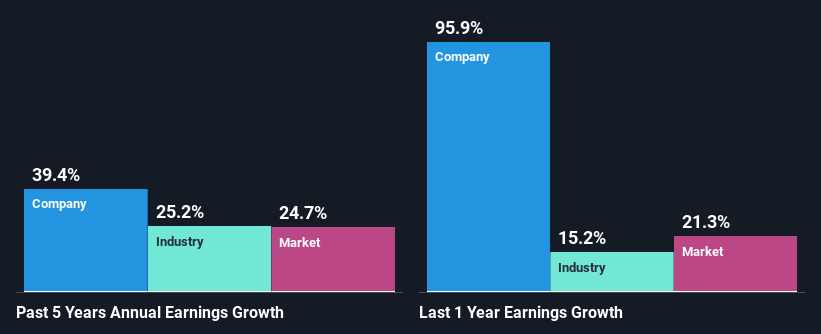Black Box Limited's (NSE:BBOX) Stock's On An Uptrend: Are Strong Financials Guiding The Market?
Most readers would already be aware that Black Box's (NSE:BBOX) stock increased significantly by 27% over the past three months. Given that the market rewards strong financials in the long-term, we wonder if that is the case in this instance. Particularly, we will be paying attention to Black Box's ROE today.
ROE or return on equity is a useful tool to assess how effectively a company can generate returns on the investment it received from its shareholders. Put another way, it reveals the company's success at turning shareholder investments into profits.
View our latest analysis for Black Box
How To Calculate Return On Equity?
ROE can be calculated by using the formula:
Return on Equity = Net Profit (from continuing operations) ÷ Shareholders' Equity
So, based on the above formula, the ROE for Black Box is:
27% = ₹1.7b ÷ ₹6.4b (Based on the trailing twelve months to September 2024).
The 'return' is the amount earned after tax over the last twelve months. Another way to think of that is that for every ₹1 worth of equity, the company was able to earn ₹0.27 in profit.
Why Is ROE Important For Earnings Growth?
Thus far, we have learned that ROE measures how efficiently a company is generating its profits. We now need to evaluate how much profit the company reinvests or "retains" for future growth which then gives us an idea about the growth potential of the company. Generally speaking, other things being equal, firms with a high return on equity and profit retention, have a higher growth rate than firms that don’t share these attributes.
A Side By Side comparison of Black Box's Earnings Growth And 27% ROE
To begin with, Black Box has a pretty high ROE which is interesting. Additionally, the company's ROE is higher compared to the industry average of 13% which is quite remarkable. Under the circumstances, Black Box's considerable five year net income growth of 39% was to be expected.
We then compared Black Box's net income growth with the industry and we're pleased to see that the company's growth figure is higher when compared with the industry which has a growth rate of 25% in the same 5-year period.

The basis for attaching value to a company is, to a great extent, tied to its earnings growth. What investors need to determine next is if the expected earnings growth, or the lack of it, is already built into the share price. This then helps them determine if the stock is placed for a bright or bleak future. Is Black Box fairly valued compared to other companies? These 3 valuation measures might help you decide.
Is Black Box Using Its Retained Earnings Effectively?
Given that Black Box doesn't pay any regular dividends to its shareholders, we infer that the company has been reinvesting all of its profits to grow its business.
Summary
In total, we are pretty happy with Black Box's performance. Specifically, we like that the company is reinvesting a huge chunk of its profits at a high rate of return. This of course has caused the company to see substantial growth in its earnings. If the company continues to grow its earnings the way it has, that could have a positive impact on its share price given how earnings per share influence long-term share prices. Let's not forget, business risk is also one of the factors that affects the price of the stock. So this is also an important area that investors need to pay attention to before making a decision on any business. Our risks dashboard will have the 1 risk we have identified for Black Box.
Valuation is complex, but we're here to simplify it.
Discover if Black Box might be undervalued or overvalued with our detailed analysis, featuring fair value estimates, potential risks, dividends, insider trades, and its financial condition.
Access Free AnalysisHave feedback on this article? Concerned about the content? Get in touch with us directly. Alternatively, email editorial-team (at) simplywallst.com.
This article by Simply Wall St is general in nature. We provide commentary based on historical data and analyst forecasts only using an unbiased methodology and our articles are not intended to be financial advice. It does not constitute a recommendation to buy or sell any stock, and does not take account of your objectives, or your financial situation. We aim to bring you long-term focused analysis driven by fundamental data. Note that our analysis may not factor in the latest price-sensitive company announcements or qualitative material. Simply Wall St has no position in any stocks mentioned.
About NSEI:BBOX
Black Box
Provides information and communications technology solutions in India, the United States, and internationally.
Proven track record with mediocre balance sheet.
Market Insights
Community Narratives



